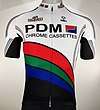PDM (cycling team)
PDM (UCI team code: PDM) was a Dutch professional cycling team from 1986 until the end of 1992. Gin-MG was co-sponsor in Spanish races and Cidona was co-sponsor in the 1991 Nissan Classic. The team was sponsored by Philips Dupont Magnetics, a joint venture between the electronics company, Philips, and the chemical company, DuPont. The team rode Concorde bicycles, manufactured in Italy, by several builders that were colour coordinated to the team jersey by Ultima.
| Team information | ||
|---|---|---|
| UCI code | PDM | |
| Registered | Netherlands | |
| Founded | 1986 | |
| Disbanded | 1992 | |
| Discipline(s) | Road | |
| Team name history | ||
1986–1989 1990–1991 1992 | PDM–Ultima–Concorde PDM–Concorde–Ultima PDM–Ultima–Concorde | |
| ||
History
Roy Schuiten was team manager and Jan Gisbers directeur sportif in 1986. Gisbers took over as the team manager the following year and remained until 1992. He was joined by Piet van der Kruijs and Ferdi van den Haute. The team was owned by Manfred Krikke, of Veltec Rentmeester.
The team was successful in classics and had a rider second overall in the Tour de France in 1987 with Pedro Delgado and 1988 with Steven Rooks. It also had third place with Erik Breukink in 1990. It won the Tour team classification in 1988 and 1989. PDM rider Gert-Jan Theunisse was second in the 1988 Tour de France, battling former PDM teammate Pedro Delgado, when he tested positive for testosterone and received a 10-minute penalty.[1]
The team dropped out of the 1991 Tour de France with reported food poisoning.[2] Team members and team doctor Wim Sanders said in a TV documentary in 2008[3] that the cause was careless storage of Intralipid, a nutritional aid with which riders had been injected.[4] The team continued one more year, after which the sponsor sold the team to Festina.
Doping affair
In November 1997 Cyclingnews.com reported an inquiry in The Netherlands,[5] which appeared to reveal doping in the PDM team. Wim Sanders, the doctor from 1990 to 1991, was the centre of the investigation, which was initiated when the general manager of the team, Manfred Krikke, called the Fiscal Information and Investigation Service to investigate. It was said Sanders supplied anabolic steroids and EPO to the team and was responsible for the intralipid affair of the 1991 Tour de France.[5] According to Cyclingnews.com, 1990 was the height of the drug taking in the team and two riders stopped with heart problems;[5] whether this refers to stopping professional cycling or performance-enhancing drugs was unclear. Gisbers denied knowledge of doping.[4]
Team Riders
Major wins
- Tour de France Points classification 1989
- World Road Race Championship 1990



- Amstel Gold Race 1986
- Paris–Tours 1987
- Züri-Metzgete 1988
- Clásica de San Sebastián 1988, 1992
- Liège–Bastogne–Liège 1988, 1989
- Giro di Lombardia 1991
- Ronde van Nederland 1986
- Vuelta a Andalucía 1986
- Grand Prix de Wallonie 1986, 1992
- Tour de Luxembourg 1986
- Paris–Brussels 1987
- Étoile de Bessèges 1988
- Grand Prix de Fourmies 1987
- Herald Sun Tour 1988
- Ruta de Mexico 1989
- Vuelta a Asturias 1989, 1990
- Tour de Trump 1990
- Tour du Pont 1990, 1991
- Tour de Suisse 1990
- Grand Prix Eddy Merckx 1991
- Nissan Classic 1990, 1991
- Giro del Piemonte 1992
References
- "Drugs and Tour de France". Association of British Cycling Coaches. Archived from the original on 2007-06-27. Retrieved 2007-11-11.
- "Illness Forces Breukink out of Tour". International Herald Tribune. Archived from the original on November 22, 2006. Retrieved 2007-11-11.
- "De bedorven kip van PDM, in Andere Tijden; broadcast on Jan 17, 2008". NOS/VPRO, Dutch public television. Retrieved 2008-04-01. (in Dutch)
- "The Dutch Doping Scandal – Part 3". cyclingnews.com. Retrieved 2007-11-11.
- "Drug Scandal in the Netherlands". cyclingnews.com. Retrieved 2007-11-11.
